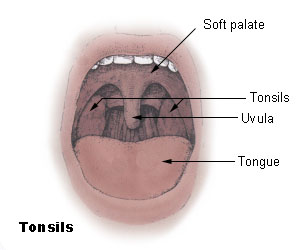Uvula

The uvula is a little piece of flesh hanging down inside the mouth at the back of the palate, where it meets the throat. The word is derived from the Latin for "grape". The uvula plays an important role in the creation of the sound of the human voice. It functions in tandem with the back of the throat, the palate, and air coming up from the lungs to create a number of guttural and other sounds.
Consonants pronounced with the uvula do not appear in English; however, languages such as French, Arabic, Hebrew and Ubykh use uvular consonants to varying degrees. Certain languages in Africa also use the uvula to produce click consonants.
The uvula also contributes to snoring or heavy breathing during sleep; having an elongated uvula can cause vibrations which lead to the snoring. In some cases this can lead to sleep apnea, which may be treated by removal of the uvula or part of the uvula if necessary. Splitting of the uvula occurs infrequently but is the most common form of mouth and nose area cleavage among newborns (roughly 2% of infants have this bifid or split uvula).
Today, the uvula is one of many body parts that people pierce. However, uvula piercings are very dangerous unless done by an expert, and only a small number of people have had this procedure.
Cartoons often feature the uvula when characters yawn or open their mouth wide. Screaming animations often show the uvula in a wiggling motion. Some cartoons have the uvula serve as a punching bag for a humorous effect.
It is often confused with the epiglottis which is a flap of skin covering the windpipe during swallowing. The uvula is in many ways like the epiglottis, when we swallow the uvula and the soft palate portion of the roof of the mouth move to cover the nasopharynx. Sometimes, however the uvula fails and may allow liquids or foods to move out through the nose.
The uvula is closely related to the tonsils and is composed of the same lymphoid tissue, this is found thoughout the gastointestinal tract, in the adenoids and on the base of the tongue. Lymphoid tissue is composed of lymphocytes...which are mostly involved in antibody production. These areas of lymphoid tissues are our immune system's first line of defense for what we breath in/pass in through our mouths.
At times, the mucous membrane around the uvula may swell, causing the uvula to expand 3-5 times its normal size. When the uvula touches the throat, it can cause sensations like gagging or choking, even though there is no foreign matter present. This can cause problems breathing, talking, and eating.
There are many theories about what causes the uvula to swell, including: 1) dehydration (from arid weather and/or alcohol); 2) excessive smoking or other inhaled irratants; 3) snoring; 4) allergic reaction; or 5) a viral or bacterial infection.
Sucking ice or applying oral anesthetics may help alleviate the gagging reflex, but there is really no easy remedy. Because the swelling can be caused by dehydration, drinking plenty of water can help to alleviate it quicker. Also, some people respond well to antihistamines when the swelling is caused by an allergic reaction. Ibuprofen is sometimes taken as an anti-inflammatory, but it is not certain whether or not this is effective in uvular swelling.
A swollen uvula is normally not life-threatening and subsides in a short time, typically within a day. However, it can also be a sign of other problems. If the swelling does not subside at all within 8-12 hours, or if it is accompanied by a sore throat or difficulty breathing, seek medical attention immediately.
Often times, when practicing football, one gets the sensation of having viscuous mucous at the back of the throat. This is in fact the somewhat dehydrated uvula actually sticking to the soft palate.
When overdosing on amphetamines, theoretically the uvula makes one sound to themself and others like they huff helium on a regular basis, but then again, I wouldn't know for sure, that is classified. (see paranoia.)
